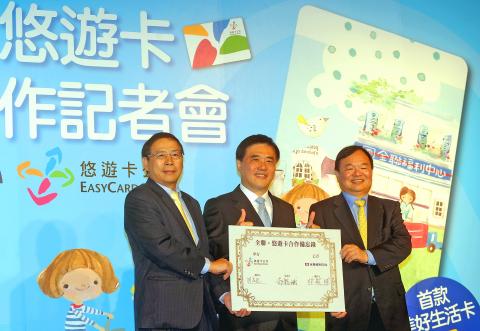Chuan Lian Enterprise Co Ltd (全聯實業), which operates the nation’s largest supermarket chain, Pxmart (全聯福利中心), yesterday said it has formed a partnership with Taipei EasyCard Corp (悠遊卡公司), in a bid to boost sales and contribute an extra 10 percent to the company’s annual sales next year.
EasyCard holders can now pay for goods purchased at more than 700 Pxmart outlets nationwide.
Before that, consumers could only use cash, or swipe their CTBC Bank (中信銀行) credit cards at Pxmart.

Photo: CNA
“This micropayment service offers consumers, especially our 7.5 million members, a more convenient way to pay at Pxmart,” Chuan Lian general manager Tony Tsai (蔡篤昌) told a media briefing.
Sales generated by EasyCard transactions are set to account for 6 percent of company revenue in the preliminary stage, expanding to 10 percent next year, Tsai said.
In addition, Chuan Lian might expand the cooperation with EasyCard to a deposit program and a reward collection program from the second quarter of next year to create more synergy, Tsai added.
To provide more ways to pay, Chuan Lian plans to enable consumers to purchase items with Taishin International Bank (台新銀行) credit cards from January next year.
Asked about the negative impact from the latest oil scandal involving Ting Hsin International Group (頂新集團), Tsai said the company has seen revenue from oil products sold in Pxmarts drop after the incident broke on Wednesday last week, with sales of certain brands down 50 percent.
Tsai said Chuan Lian has taken down problematic oil products from Pxmart outlets’ shelves for two months, indicating that the company obtained the related information ahead of the public.
Chuan Lian chairman Lin Ming-hsiung (林敏雄) further criticized Ting Hsin for its actions, which he said have broken the nation’s reputation as a “kingdom of delicacies.”
However, Chuan Lian does not plan to refuse to sell unproblematic products related to the Ting Hsin group, adding that the company is set to follow government instructions in the issue.

CAUTIOUS RECOVERY: While the manufacturing sector returned to growth amid the US-China trade truce, firms remain wary as uncertainty clouds the outlook, the CIER said The local manufacturing sector returned to expansion last month, as the official purchasing managers’ index (PMI) rose 2.1 points to 51.0, driven by a temporary easing in US-China trade tensions, the Chung-Hua Institution for Economic Research (CIER, 中華經濟研究院) said yesterday. The PMI gauges the health of the manufacturing industry, with readings above 50 indicating expansion and those below 50 signaling contraction. “Firms are not as pessimistic as they were in April, but they remain far from optimistic,” CIER president Lien Hsien-ming (連賢明) said at a news conference. The full impact of US tariff decisions is unlikely to become clear until later this month

GROWING CONCERN: Some senior Trump administration officials opposed the UAE expansion over fears that another TSMC project could jeopardize its US investment Taiwan Semiconductor Manufacturing Co (TSMC, 台積電) is evaluating building an advanced production facility in the United Arab Emirates (UAE) and has discussed the possibility with officials in US President Donald Trump’s administration, people familiar with the matter said, in a potentially major bet on the Middle East that would only come to fruition with Washington’s approval. The company has had multiple meetings in the past few months with US Special Envoy to the Middle East Steve Witkoff and officials from MGX, an influential investment vehicle overseen by the UAE president’s brother, the people said. The conversations are a continuation of talks that

CHIP DUTIES: TSMC said it voiced its concerns to Washington about tariffs, telling the US commerce department that it wants ‘fair treatment’ to protect its competitiveness Taiwan Semiconductor Manufacturing Co (TSMC, 台積電) yesterday reiterated robust business prospects for this year as strong artificial intelligence (AI) chip demand from Nvidia Corp and other customers would absorb the impacts of US tariffs. “The impact of tariffs would be indirect, as the custom tax is the importers’ responsibility, not the exporters,” TSMC chairman and chief executive officer C.C. Wei (魏哲家) said at the chipmaker’s annual shareholders’ meeting in Hsinchu City. TSMC’s business could be affected if people become reluctant to buy electronics due to inflated prices, Wei said. In addition, the chipmaker has voiced its concern to the US Department of Commerce

STILL LOADED: Last year’s richest person, Quanta Computer Inc chairman Barry Lam, dropped to second place despite an 8 percent increase in his wealth to US$12.6 billion Staff writer, with CNA Daniel Tsai (蔡明忠) and Richard Tsai (蔡明興), the brothers who run Fubon Group (富邦集團), topped the Forbes list of Taiwan’s 50 richest people this year, released on Wednesday in New York. The magazine said that a stronger New Taiwan dollar pushed the combined wealth of Taiwan’s 50 richest people up 13 percent, from US$174 billion to US$197 billion, with 36 of the people on the list seeing their wealth increase. That came as Taiwan’s economy grew 4.6 percent last year, its fastest pace in three years, driven by the strong performance of the semiconductor industry, the magazine said. The Tsai